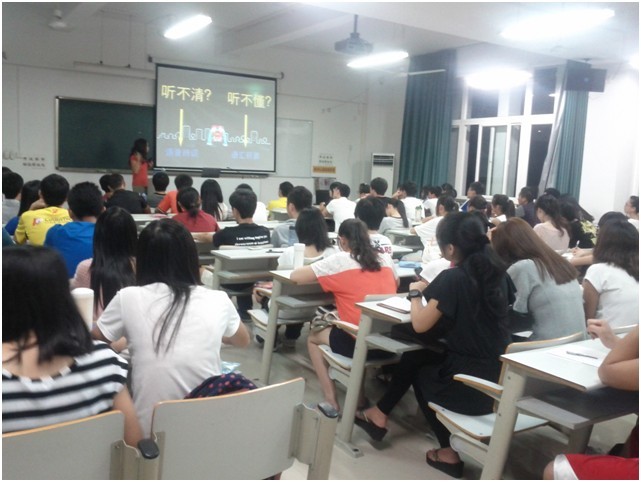 返回
教育头条
返回
教育头条

英语四六级考试真题分享
关于英语四六级考试,小编今天给大家带来了一些真题的分享,希望对大家的学习有所进步。预祝大家高分通过!
Section A
Directions:
In this section, you will hear three news reports. At the end of each news report, you will hear two or three questions. Both the news report and the questions will be spoken only once. After you hear a question, you must choose the best answer from the four choices marked A), B), C) and D). Then mark the corresponding letter on Answer Sheet 1 with a single line through the centre.
News Report One
Officials in Thailand found 40 dead tiger cubs at a Buddhist temple accused of animal abuse. The dead cubs were discovered Wednesday in a freezer at the temple, west of Bangkok. Authorities found them while removing dozens of mostly full-grown live tigers from the temple grounds. Officials said the cubs appeared to be about a week old. It was not known why they were in the freezer, where temple staff kept food. Monks have been operating an unsanctioned zoo, called Tiger Temple. Tourists paid money to view and take pictures with the tigers and other exotic animals. Thai authorities plan to file charges against the temple for illegally possessing endangered species.
Question 1 and 2 are based on the news report you have just heard.
1. What do we learn from the news report?
2. How old were the tiger cubs?
News Report Two
Switzerland has opened the world's longest and deepest railway tunnel, 17 years after starting work on the project. The Gotthard Railway Tunnel is 57 kilometers long. Trains passing through it will be about 2.3 kilometers underground at the deepest point. The tunnel cost 12 billion dollars to build under the Alps of central Switzerland. The tunnel will reduce the time it takes trains to travel between northern and southern Europe. It is also expected to lower the number of vehicles on roads, and move cargo between north and south. The two-way tunnel opens for commercial service in December. When that happens, up to 260 freight trains and 65 passenger trains will be able to pass through it every day.
Question 3 and 4 are based on the news report you have just heard.
3. How many kilometers is the world's longest and deepest railway tunnel?
4. What advantages can the tunnel bring to Europe?
News Report Three
A Japanese boy named Yamato Tanooka remains missing four days after his parents abandoned him as a punishment, police said. Japan's military joined the search Wednesday for the 7-year-old boy missing in a forest in northern Japan. But on Wednesday night, the boy still had not been found. About 275 soldiers, police and volunteers searched for him Wednesday. The boy has been missing since Saturday, when his parents made him get out of their car to punish him for throwing rocks at cars and people, according to police. Kyodo News Service said police are looking into whether the parents should be charged with child abandonment. Child psychiatrists said even a threat of leaving a child behind is child abuse because of the stress it creates. Police said the boy's father, Takayuki Tanooka, returned to the area to look for his son a few minutes later, but could not find him. Tanooka first told police his son disappeared while the family was picking vegetables. He later said that he and his wife had punished their son for bad behavior.
Question 5 to 7 are based on the news report you have just heard.
5. How was the boy missing?
6. Who searched for the boy four days after his parents abandoned him?
7. When was the boy missing?
Section B
Directions:
In this section, you will hear two long conversations. At the end of each conversation, you will hear four questions. Both the conversation and the questions will be spoken only once. After you hear a question, you must choose the best answer from the four choices marked A), B), C) and D). Then mark the corresponding letter on Answer Sheet 1 with a single line through the centre.
Conversation One
W: Hello, Parkson College. May I help you?
M: Yes. I'm looking for information on courses in computer programming. I would need it for the fall semester.
W: Do you want a day or evening course?
M: Well, it would have to be an evening course since I work during the day.
W: Aha. Have you taken any courses in data processing?
M: No.
W: Oh. Well, data processing is a course you have to take before you can take computer programming.
M: Oh, I see. Well, when is it given? I hope it's not on Thursdays.
W: Well, there's a class that meets on Monday evenings at seven.
M: Just once a week?
W: Yes. But that's almost three hours from seven to nine forty-five.
M: Oh. Well, that's alright. I could manage that. How many weeks does the course last?
W: Mmmm, let me see. Twelve weeks. You start the first week in September, and finish, oh, just before Christmas. December 21st.
M: And how much is the course?
W: That's three hundred dollars including the necessary computer time.
M: Aha. Okay. Ah, where do I go to register?
W: Registration is on the second and third of September, between 6:00 and 9:00 in Frost Hall.
M: Is that the round building behind the parking lot?
W: Yes. That's the one.
M: Oh, I know how to get there. Is there anything that I should bring with me?
W: No, just your checkbook.
M: Well, thank you so much.
W: You are very welcome. Bye!
M: Bye!
Questions 8 to 11 are based on the conversation you have just heard.
8. Why does the man choose to take an evening course?
9. What does the man have to do before taking the course of computer programming?
10. What do we learn about the schedule of the evening course?
11. What does the man want to know at the end of the conversation?
Conversation Two
W: So why exactly does your job have a reputation for being stressful?
M: Stress is generally driven by the feeling of being out of control of a situation and the feeling of a situation controlling you. Trading in financial markets combines both.
W: How do you relax in the evening?
M: I very rarely do anything work-related so it's easy to escape "The Markets". I generally go to the gym or go for a run, especially if I've had a bad day. I always cook a meal rather than have a take-away to do something my brain would regard as creative.
W: Do you think what you do to relax is an effective way to beat stress?
M: I don't think there's a specific rule about how to beat stress. I generally find that what I do is effective for me.
W: Would you consider changing your job because of the high stress factor?
M: I have considered leaving my job due to stress-related factors. However, I do think that an element of stress is a good thing, and if used the right way, can actually be a positive thing.
W: What do you enjoy about the stressful aspects of your job?
M: Having said all that, I do enjoy an element of uncertainty. I enjoy a mental challenge. Trading generates a wide range of emotions second by second. How you deal with and manage those emotions, dictates short, medium and long term trading performance and success.
Questions 12 to 15 are based on the conversation you have just heard.
12. What is the man's job?
13. Why does the man prefer to cook a meal rather than have a take-away?
14. What does the man say about an element of stress in his job?
15. What does the man enjoy about the stressful parts of his job?
Section C
Directions:
In this section, you will hear three passages. At the end of each passage, you will hear three ot four questions. Both the passage and the questions will be spoken only once. After you hear a question, you must choose the best answer from the four choices marked A), B), C) and D). Then mark the corresponding letter on Answer Sheet 1 with a single line through the centre.

Passage One
Since early times, people have been fascinated with the idea of life existing somewhere else besides earth. Until recently, scientists believed that life on other planets was just a hopeful dream. But now they are beginning to locate places where life could form. In 1997, they saw evidence of planets near other stars like the sun. But scientists now think that life could be even nearer in our own solar system. One place scientists are studying very closely is Europa, a moon of Jupiter. Space probes have provided evidence that Europa has a large ocean under its surface. The probes have also made scientists think that under its surface Europa has a rocky core giving off volcanic heat. Water and heat from volcanic activity are two basic conditions needed for life to form. A third is certain basic chemicals such as carbon, oxygen and nitrogen. Scientists believe there might be such chemicals lying at the bottom of Europa's ocean. They may have already created life, or may be about to. You may wonder if light is also needed for life to form. Until recently, scientists thought that light was essential. But now, places have been found on earth that are in total blackness, such as caves several miles beneath the surface, and bacteria, primitive forms of life, have been seen there. So the lack of light in Europa's subsurface ocean doesn't automatically rule out life forming.
Questions 16 to 18 are based on the passage you have just heard.
16. What did scientists once believe according to the passage?
17. What have scientists found about Europa, a moon of Jupiter?
18. What have scientists come to know recently about the formation of life?
Passage Two
In her early days as an emergency room physician, Dr. Joanna Meyer treated a child who had suffered a second degree burn. After the child had been treated, and was being prepared for discharge, Dr.Meyer talked to the parents about how they should care for the child at home. Also listening to her were a half dozen other family members. A few hours later, when she came to say goodbye, the family asked her to settle an argument they've been having over exactly what advice she had given. "As I talked to them, I was amazed," she said. "All of them had heard the simple instructions I had given just a few hours before. But they had three or four different versions. The most basic details were unclear and confusing. I was surprised, because these were intelligent people." This episode gave Dr. Meyer her first clue to something every doctor learns sooner or later- most people just don't listen very well. Nowadays, she says, she repeats her instructions, and even conducts a reality check with some patients: she asks them to tell her what they think they're supposed to do. She also provides take-home sheets, which are computer printouts tailored to the patients' situation. Dr. Meyer's listeners are not unusual. When new or difficult material is presented, almost all listeners are faced with a challenge because human speech lacks the stability and permanence of the printed word. Oral communication is fast-moving and impermanent.
Questions 19 to 21 are based on the passage you have just heard.
19. What did the child's family members argue about in the hospital?
20. What does Dr. Meyer do to ensure her patients understand her instructions?
21. What does the speaker say about human speech?
Passage Three
It is logical to suppose that things like good labour relations, good working conditions, good wages and benefits, and job security motivate workers. But one expert, Frederick Herzberg argued that such conditions do not motivate workers. They are merely "satisfiers". "Motivators", in contrast, include things such as having a challenging and interesting job, recognition and responsibility. However, even with the development of computers and robotics, there are always plenty of boring, repetitive and mechanical jobs, and lots of unskilled people who have to do them. So how do managers motivate people in such jobs? One solution is to give them some responsibilities, not as individuals but as part of a team. For example, some supermarkets combine office staff, the people who fill the shelves, and the people who work at the checkout into a team, and let them decide what product lines to stock, how to display them, and so on. Many people now talk about the importance of a company's shared values or culture, with which all the staff can identify: for example, being the best hotel chain, or making the best, the most user-friendly or the most reliable products in a particular field. Such values are more likely to motivate workers than financial targets, which ultimately only concern a few people. Unfortunately, there is only a limited number of such goals to go round, and by definition, not all the competing companies in an industry can seriously claim to be the best.
Questions 22 to 25 are based on the passage you have just heard.
22. What can actually motivate workers according to Frederick Herzberg?
23. What does the speaker say about jobs in the computer era?
24. What do some supermarkets do to motivate their employees?
25. Why does the speaker say financial targets are less likely to motivate workers?
This is the end of listening comprehension.
参考答案:
1.C)Sometigercubsweredeadbecauseofabuse.
2.B)About7days.
3.C) 57.
4.D)AllofA、BandC.
5.A)Hewasabandonedbyhisparents.
6.B)Soldiers,policeandvolunteers.
7.D)SinceSaturday.
8.C)Hehastoworkduringtheday.
9.B)Learndataprocessing.
10.C)EveryMonday,lastingfor12weeks.
11.A)Whattobringforregistration.
12.D)Afinancialtrader.
13.B)Heconsiderscookingcreative.
14.D)Itcanbeagoodthing.
15.A)Theelementofuncertaintyandthementalchallenge.
16.C)Lifewasnotpossibleinouterspace.
17.C)Ithasalargeoceanunderitssurface.
18.A)Lightisnotanessentialelementtoit.
19.B)WhatDr.Meyer'sinstructionsexactlywere.
20.D)Sheasksthemtorepeatwhattheyaresupposedtodo.
21.A)Itlacksthestabilityoftheprintedword.
22.C)Challengingwork.
23.A)Manytediousjobscontinuetobedonemanually.
24.D)Givethemresponsibilitiesaspartofateam.
25.B)Theyconcernasmallnumberofpeopleonly.
Section A
Directions:
In this section, you will hear three news reports. At the end of each news report, you will hear two or three questions. Both the news report and the questions will be spoken only once. After you hear a question, you must choose the best answer from the four choices marked A), B), C) and D). Then mark the corresponding letter on Answer Sheet 1 with a single line through the centre.
News Report One
Officials in Thailand found 40 dead tiger cubs at a Buddhist temple accused of animal abuse. The dead cubs were discovered Wednesday in a freezer at the temple, west of Bangkok. Authorities found them while removing dozens of mostly full-grown live tigers from the temple grounds. Officials said the cubs appeared to be about a week old. It was not known why they were in the freezer, where temple staff kept food. Monks have been operating an unsanctioned zoo, called Tiger Temple. Tourists paid money to view and take pictures with the tigers and other exotic animals. Thai authorities plan to file charges against the temple for illegally possessing endangered species.
Question 1 and 2 are based on the news report you have just heard.
1. What do we learn from the news report?
2. How old were the tiger cubs?
News Report Two
Switzerland has opened the world's longest and deepest railway tunnel, 17 years after starting work on the project. The Gotthard Railway Tunnel is 57 kilometers long. Trains passing through it will be about 2.3 kilometers underground at the deepest point. The tunnel cost 12 billion dollars to build under the Alps of central Switzerland. The tunnel will reduce the time it takes trains to travel between northern and southern Europe. It is also expected to lower the number of vehicles on roads, and move cargo between north and south. The two-way tunnel opens for commercial service in December. When that happens, up to 260 freight trains and 65 passenger trains will be able to pass through it every day.
Question 3 and 4 are based on the news report you have just heard.
3. How many kilometers is the world's longest and deepest railway tunnel?
4. What advantages can the tunnel bring to Europe?
News Report Three
A Japanese boy named Yamato Tanooka remains missing four days after his parents abandoned him as a punishment, police said. Japan's military joined the search Wednesday for the 7-year-old boy missing in a forest in northern Japan. But on Wednesday night, the boy still had not been found. About 275 soldiers, police and volunteers searched for him Wednesday. The boy has been missing since Saturday, when his parents made him get out of their car to punish him for throwing rocks at cars and people, according to police. Kyodo News Service said police are looking into whether the parents should be charged with child abandonment. Child psychiatrists said even a threat of leaving a child behind is child abuse because of the stress it creates. Police said the boy's father, Takayuki Tanooka, returned to the area to look for his son a few minutes later, but could not find him. Tanooka first told police his son disappeared while the family was picking vegetables. He later said that he and his wife had punished their son for bad behavior.
Question 5 to 7 are based on the news report you have just heard.
5. How was the boy missing?
6. Who searched for the boy four days after his parents abandoned him?
7. When was the boy missing?
Section B
Directions:
In this section, you will hear two long conversations. At the end of each conversation, you will hear four questions. Both the conversation and the questions will be spoken only once. After you hear a question, you must choose the best answer from the four choices marked A), B), C) and D). Then mark the corresponding letter on Answer Sheet 1 with a single line through the centre.
Conversation One
W: Hello, Parkson College. May I help you?
M: Yes. I'm looking for information on courses in computer programming. I would need it for the fall semester.
W: Do you want a day or evening course?
M: Well, it would have to be an evening course since I work during the day.
W: Aha. Have you taken any courses in data processing?
M: No.
W: Oh. Well, data processing is a course you have to take before you can take computer programming.
M: Oh, I see. Well, when is it given? I hope it's not on Thursdays.
W: Well, there's a class that meets on Monday evenings at seven.
M: Just once a week?
W: Yes. But that's almost three hours from seven to nine forty-five.
M: Oh. Well, that's alright. I could manage that. How many weeks does the course last?
W: Mmmm, let me see. Twelve weeks. You start the first week in September, and finish, oh, just before Christmas. December 21st.
M: And how much is the course?
W: That's three hundred dollars including the necessary computer time.
M: Aha. Okay. Ah, where do I go to register?
W: Registration is on the second and third of September, between 6:00 and 9:00 in Frost Hall.
M: Is that the round building behind the parking lot?
W: Yes. That's the one.
M: Oh, I know how to get there. Is there anything that I should bring with me?
W: No, just your checkbook.
M: Well, thank you so much.
W: You are very welcome. Bye!
M: Bye!
Questions 8 to 11 are based on the conversation you have just heard.
8. Why does the man choose to take an evening course?
9. What does the man have to do before taking the course of computer programming?
10. What do we learn about the schedule of the evening course?
11. What does the man want to know at the end of the conversation?
Conversation Two
W: So why exactly does your job have a reputation for being stressful?
M: Stress is generally driven by the feeling of being out of control of a situation and the feeling of a situation controlling you. Trading in financial markets combines both.
W: How do you relax in the evening?
M: I very rarely do anything work-related so it's easy to escape "The Markets". I generally go to the gym or go for a run, especially if I've had a bad day. I always cook a meal rather than have a take-away to do something my brain would regard as creative.
W: Do you think what you do to relax is an effective way to beat stress?
M: I don't think there's a specific rule about how to beat stress. I generally find that what I do is effective for me.
W: Would you consider changing your job because of the high stress factor?
M: I have considered leaving my job due to stress-related factors. However, I do think that an element of stress is a good thing, and if used the right way, can actually be a positive thing.
W: What do you enjoy about the stressful aspects of your job?
M: Having said all that, I do enjoy an element of uncertainty. I enjoy a mental challenge. Trading generates a wide range of emotions second by second. How you deal with and manage those emotions, dictates short, medium and long term trading performance and success.
Questions 12 to 15 are based on the conversation you have just heard.
12. What is the man's job?
13. Why does the man prefer to cook a meal rather than have a take-away?
14. What does the man say about an element of stress in his job?
15. What does the man enjoy about the stressful parts of his job?
Section C
Directions:
In this section, you will hear three passages. At the end of each passage, you will hear three ot four questions. Both the passage and the questions will be spoken only once. After you hear a question, you must choose the best answer from the four choices marked A), B), C) and D). Then mark the corresponding letter on Answer Sheet 1 with a single line through the centre.

Passage One
Since early times, people have been fascinated with the idea of life existing somewhere else besides earth. Until recently, scientists believed that life on other planets was just a hopeful dream. But now they are beginning to locate places where life could form. In 1997, they saw evidence of planets near other stars like the sun. But scientists now think that life could be even nearer in our own solar system. One place scientists are studying very closely is Europa, a moon of Jupiter. Space probes have provided evidence that Europa has a large ocean under its surface. The probes have also made scientists think that under its surface Europa has a rocky core giving off volcanic heat. Water and heat from volcanic activity are two basic conditions needed for life to form. A third is certain basic chemicals such as carbon, oxygen and nitrogen. Scientists believe there might be such chemicals lying at the bottom of Europa's ocean. They may have already created life, or may be about to. You may wonder if light is also needed for life to form. Until recently, scientists thought that light was essential. But now, places have been found on earth that are in total blackness, such as caves several miles beneath the surface, and bacteria, primitive forms of life, have been seen there. So the lack of light in Europa's subsurface ocean doesn't automatically rule out life forming.
Questions 16 to 18 are based on the passage you have just heard.
16. What did scientists once believe according to the passage?
17. What have scientists found about Europa, a moon of Jupiter?
18. What have scientists come to know recently about the formation of life?
Passage Two
In her early days as an emergency room physician, Dr. Joanna Meyer treated a child who had suffered a second degree burn. After the child had been treated, and was being prepared for discharge, Dr.Meyer talked to the parents about how they should care for the child at home. Also listening to her were a half dozen other family members. A few hours later, when she came to say goodbye, the family asked her to settle an argument they've been having over exactly what advice she had given. "As I talked to them, I was amazed," she said. "All of them had heard the simple instructions I had given just a few hours before. But they had three or four different versions. The most basic details were unclear and confusing. I was surprised, because these were intelligent people." This episode gave Dr. Meyer her first clue to something every doctor learns sooner or later- most people just don't listen very well. Nowadays, she says, she repeats her instructions, and even conducts a reality check with some patients: she asks them to tell her what they think they're supposed to do. She also provides take-home sheets, which are computer printouts tailored to the patients' situation. Dr. Meyer's listeners are not unusual. When new or difficult material is presented, almost all listeners are faced with a challenge because human speech lacks the stability and permanence of the printed word. Oral communication is fast-moving and impermanent.
Questions 19 to 21 are based on the passage you have just heard.
19. What did the child's family members argue about in the hospital?
20. What does Dr. Meyer do to ensure her patients understand her instructions?
21. What does the speaker say about human speech?
Passage Three
It is logical to suppose that things like good labour relations, good working conditions, good wages and benefits, and job security motivate workers. But one expert, Frederick Herzberg argued that such conditions do not motivate workers. They are merely "satisfiers". "Motivators", in contrast, include things such as having a challenging and interesting job, recognition and responsibility. However, even with the development of computers and robotics, there are always plenty of boring, repetitive and mechanical jobs, and lots of unskilled people who have to do them. So how do managers motivate people in such jobs? One solution is to give them some responsibilities, not as individuals but as part of a team. For example, some supermarkets combine office staff, the people who fill the shelves, and the people who work at the checkout into a team, and let them decide what product lines to stock, how to display them, and so on. Many people now talk about the importance of a company's shared values or culture, with which all the staff can identify: for example, being the best hotel chain, or making the best, the most user-friendly or the most reliable products in a particular field. Such values are more likely to motivate workers than financial targets, which ultimately only concern a few people. Unfortunately, there is only a limited number of such goals to go round, and by definition, not all the competing companies in an industry can seriously claim to be the best.
Questions 22 to 25 are based on the passage you have just heard.
22. What can actually motivate workers according to Frederick Herzberg?
23. What does the speaker say about jobs in the computer era?
24. What do some supermarkets do to motivate their employees?
25. Why does the speaker say financial targets are less likely to motivate workers?
This is the end of listening comprehension.
参考答案:
1.C)Sometigercubsweredeadbecauseofabuse.
2.B)About7days.
3.C) 57.
4.D)AllofA、BandC.
5.A)Hewasabandonedbyhisparents.
6.B)Soldiers,policeandvolunteers.
7.D)SinceSaturday.
8.C)Hehastoworkduringtheday.
9.B)Learndataprocessing.
10.C)EveryMonday,lastingfor12weeks.
11.A)Whattobringforregistration.
12.D)Afinancialtrader.
13.B)Heconsiderscookingcreative.
14.D)Itcanbeagoodthing.
15.A)Theelementofuncertaintyandthementalchallenge.
16.C)Lifewasnotpossibleinouterspace.
17.C)Ithasalargeoceanunderitssurface.
18.A)Lightisnotanessentialelementtoit.
19.B)WhatDr.Meyer'sinstructionsexactlywere.
20.D)Sheasksthemtorepeatwhattheyaresupposedtodo.
21.A)Itlacksthestabilityoftheprintedword.
22.C)Challengingwork.
23.A)Manytediousjobscontinuetobedonemanually.
24.D)Givethemresponsibilitiesaspartofateam.
25.B)Theyconcernasmallnumberofpeopleonly.
上述就是教育宝头条介绍的英语四六级考试真题分享完整信息,想要查看更多的四级六级考试资讯,敬请关注我的微信18560125702,还可免费获取学习攻略哦!返回教育宝头条
【免责声明】本文仅代表作者本人观点,与教育宝无关。教育宝对文中陈述、观点判断保持中立,不对所包含内容的准确性、可靠性或完整性提供任何保证。请读者仅作参考,特此声明!





